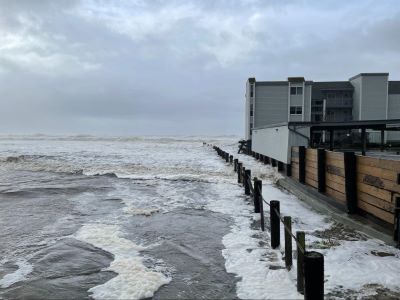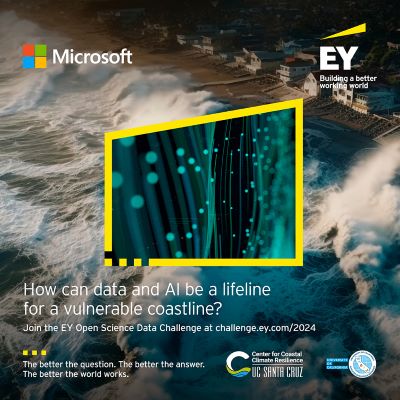Campus News
UC Santa Cruz’s Center for Coastal Climate Resilience partnering with EY on Open Science Data Challenge on Coastal Resilience for students
Climate change is here, and so are its impacts on our communities. Globally, coastal hazards produce increasing costs, often to the most vulnerable populations. That’s why UC Santa Cruz’s Center for Coastal Climate Resilience (CCCR) and the University of California Disaster Resilience Network (UCDRN) are partnering with EY on its 2024 Open Science Data Challenge, focused on coastal resilience. CCCR will be hosting an event on campus on Jan. 25 for interested undergraduate and graduate students, postdoctoral researchers, and faculty to learn more about this significant opportunity.


Climate change is here, and so are its impacts on our communities. Globally, coastal hazards produce increasing costs, often to the most vulnerable populations. That’s why UC Santa Cruz’s Center for Coastal Climate Resilience (CCCR) and the University of California Disaster Resilience Network (UCDRN) are partnering with EY on its 2024 Open Science Data Challenge, focused on coastal resilience. CCCR will be hosting an event on campus on Jan. 25 for interested undergraduate and graduate students, postdoctoral researchers, and faculty to learn more about this significant opportunity.
The EY challenge allows early-career professionals and university students to use data, artificial intelligence, and technology to help build a sustainable future for society and the planet. This year, EY and UCSC are co-designing the challenge on coastal resilience. Participants will use high-resolution satellite datasets and machine learning to build predictive models to help vulnerable communities adapt to evolving conditions and recover from extreme climate events.
“The center is excited to partner with EY in engaging UC students and researchers in their exploration of solutions that can address the climate challenges currently impacting nature and people,” said Mike Beck, director of the Center for Coastal Climate Resilience.
A kickoff event with leading coastal resilience experts from the Office of Research, CCCR, and EY will be held on Jan. 25 at 10 a.m. in the Alumni Room at the University Center on the UC Santa Cruz campus. The event will include a Q&A session. Students from throughout the UC system can also attend online and ask their questions about the challenge on Vimeo.
Borja Reguero, an associate professor on coastal risks with the Coastal Science and Policy Program at UCSC is co-designing the challenge with EY and will be evaluating the participant submissions.
“The University of California produces some of the brightest minds in the country, and I look forward to seeing their creativity shine in this data challenge,” said Reguero. “Leveraging the increasing power of remote sensing has great potential to help vulnerable coastal communities who bear the largest burden of extreme weather events.”
Throughout the challenge, UCSC and UCDRN, will tap the UC system’s expertise in disaster resilience response and conduct scientific evaluations of participant submissions. UCDRN works with the 10 UC campuses to inform action that considers all facets of prevention, preparedness, response, and recovery, including the health, safety, socioeconomics, equity, and environmental sustainability of communities.
Registration for the 2024 challenge is now open; the challenge begins on Feb. 1. The best ideas are eligible for cash prizes up to $10,000 and attendance at a July 2024 celebration at the 2024 IEEE International Geoscience and Remote Sensing Symposium in Athens, Greece.
To learn more, visit challenge.ey.com/2024.